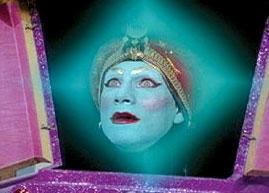 ("Lampbox" by Alan98)
("Lampbox" by Alan98)
Regret the Error, edited by Craig Silverman, has published 2007's media errors and corrections, an equally entertaining and disturbing list of errata. Included in the compilation are Trends of Note (mostly misrepresentations about Barack Obama), Student Plagiarisms, Mistaken for Terrorists (the British press seems to be especially fond of mislabeling Arab leaders as terrorists), and the Correction of the Year, followed by the runner-up, hilariously copied in below:
"This year’s winner is a correction to an April article in the Independent Saturday (UK) magazine:
Following the portrait of Tony and Cherie Blair published on 21 April in the Independent Saturday magazine, Ms Blair’s representatives have told us that she was friendly with but never had a relationship with Carole Caplin of the type suggested in the article. They want to make it clear, which we are happy to do, that Ms Blair “has never shared a shower with Ms Caplin, was not introduced to spirit guides or primal wrestling by Ms Caplin (or anyone else), and did not have her diary masterminded by Ms Caplin.”
"Runner Up -- The Sentinel-Review (Woodstock, Ontario):
In an article in Monday’s newspaper, there may have been a misperception about why a Woodstock man is going to Afghanistan on a voluntary mission. Kevin DeClark is going to Afghanistan to gain life experience to become a police officer when he returns, not to shoot guns and blow things up.
The The Sentinel-Review apologizes for any embarrassment this may have caused."
Gastronomica, the Journal of Food and Culture, has a feature by Mark Morton called Ort of the Week, an explanation of a food-related bit of vocabulary. Ort, the site explains, "was originally a scrap of food or leftover fodder not eaten by cattle or pigs. The word then came to be applied to leftovers from the kitchen table, leftovers that were also known as relief or relics. Ort appeared in the mid fifteenth century as a compound of the prefix oor, meaning not, and etan, meaning to eat; quite literally, therefore, orts are the uneaten scraps of a meal."
For word-freaks who love food, check out such past orts as runcible spoon, spurtle, fletcherize, catillation, and the unexpected origin of cookie. Perhaps it will help your score in Free Rice!
Illustration Art is David Apatoff's blog dedicated to "celebrating great art in humble places: the glorious talents of the artists who illustrated stories, advertisements and comics in the 20th century". His latest post, Words and Pictures, begins "When words and pictures are combined to tell a story, one medium or the other usually ends up doing most of the heavy lifting." He goes on to talk about examples of each (mentioned Alison Bechdel's Fun Home, Art Spiegelman's Maus, and Chris Ware's Jimmy Corrigan), before arriving at Mort Drucker whose body of work for Mad Magazine has gone entirely too unrecognized. For any of us who grew on on Mad, it's a fascinating read, and the discussion in comments is illuminating as well. (Meka leka hi meka hiney ho)
(Meka leka hi meka hiney ho)
Words Without Borders, an online magazine for international literature, "opens doors to international exchange through translation of the world’s best writing — selected and translated by a distinguished group of writers, translators, and publishing professionals — and publishing and promoting these works (or excerpts) on the web....Our ultimate aim is to introduce exciting international writing to the general public — travelers, teachers, students, publishers, and a new generation of eclectic readers — by presenting international literature not as a static, elite phenomenon, but a portal through which to explore the world. In the richness of cultural information we present, we hope to help foster a 'globalization' of cultural engagement and exchange, one that allows many voices in many languages to prosper."
Seguing into other boundary expansions, I highly recommend the review of Thomas Hines' The Great Funk book by Annali Rufus currently at Alternet, "Blame It All On The 70's?" One paragraph reads: "Ecology. Diversity. Ethnic and sexual identity. Individuality. Alternative sources of energy. Feminism. Fundamentalist spirituality. Retrace our steps (in Earth shoes and a crocheted vest and Dacron flares, of course) through Jimmy Swaggart and solar-heated geodesic domes and blaxploitation films and the Village People and you will find it there, albeit all innocent and earnest and embryonic. And not just the topics themselves but the ways in which we face them now: our wary citizen-journalist vigilance, questioning authority, scoping out conspiracies, pursuing truthiness."
It's a really good grasp of a pivotal decade, I found. So many of our current analyses begin "Thirty years ago..." I'm sure this essay will spawn some of my own, but I'll leave you here with another paragraph:
"Apocalyptic and disco fantasies mixed giddily in those years with a yen for authenticity -- by which yogurt and animal-rights activism and vibrators became mainstream, and by which manufacturers got rich churning out decor in feculent "earth tones." And this is what marks the '70s: this urgency, this dazed, tender, ever-so-public awakening on the cusp between Strawberry Fields and multinationals. It was the decade when a hundred pride movements bloomed. So much pride, so little embarrassment."
And, to jumpstart the year, Sara Robinson at Orcinus is "launching a short series presenting a few things we might bear in mind as we get organized for the long journey ahead". The first post, "2008: A Year in Limbo" is up, beginning with stanzas from Yeats' "The Second Coming". Be brave and read it. Better to think and know than to not, honestly. (Thx to little gator for this image.)
(Thx to little gator for this image.)
Wednesday, January 2, 2008
WORDS WITHOUT END, AMEN
Posted by
Maggie Jochild
at
12:43 PM
![]()
Labels: Annali Rufus, Blame It On The 70s, David Apatoff, Illustration Art, Orcinus, Ort of the Week, Regret the Error, Thomas Hines, Words Without Borders
Subscribe to:
Post Comments (Atom)






2 comments:
So glad you linked David Aptoff's blog, Illustration Art. I depend on him for insights into art that I rarely find anywhere else. If only he would be hired by PBS or Ovation, where the ideas in the art documentaries are insipid in comparison.
So many pubic critics these days rely on emotional response, or saying that they don't know how to describe why something works or doesn't.
Aptoff knows and can articulate what is working and why. I love that. Plus he brings so much art to our attention.
A daily dose of Aptoff with a weekly dose of Walter Benjamin and I feel better prepared to face the world of art.
Thanks for including pictures with the words, Maggie.
I will be following Sara Robinson's follow-ups to today's essay.
Jan
Post a Comment